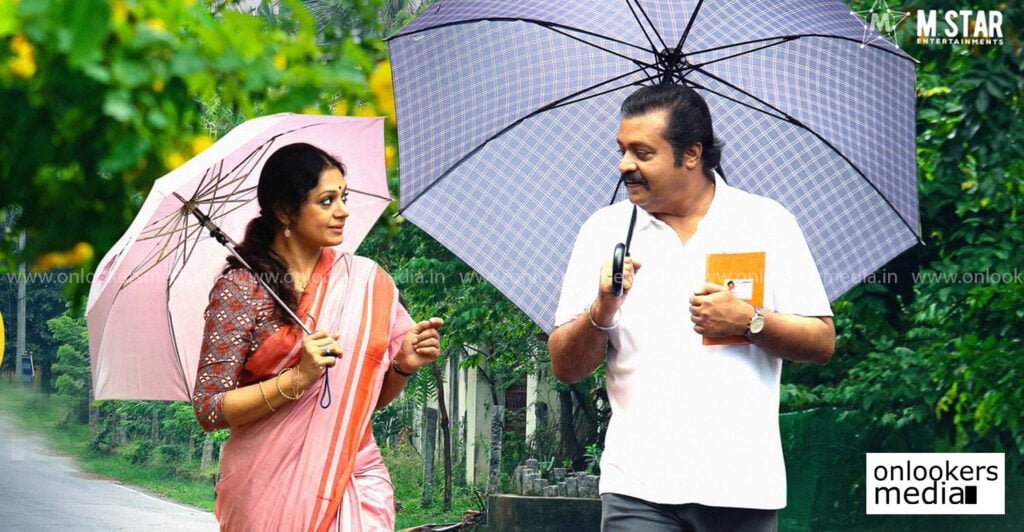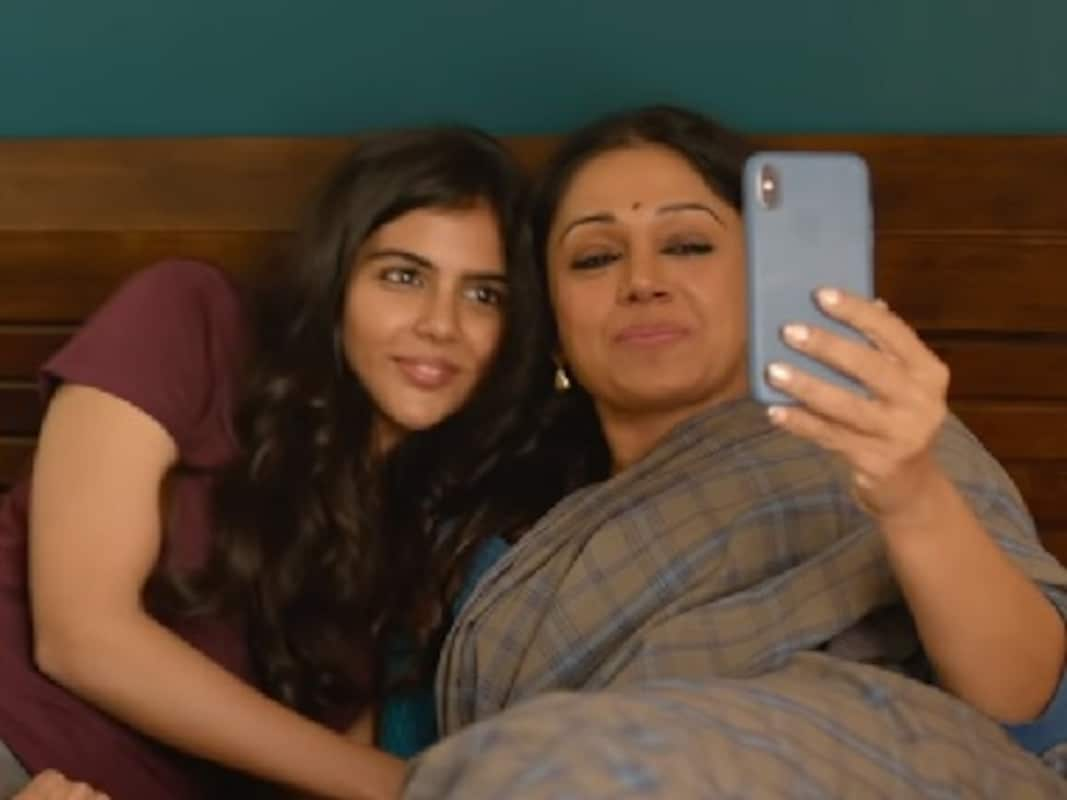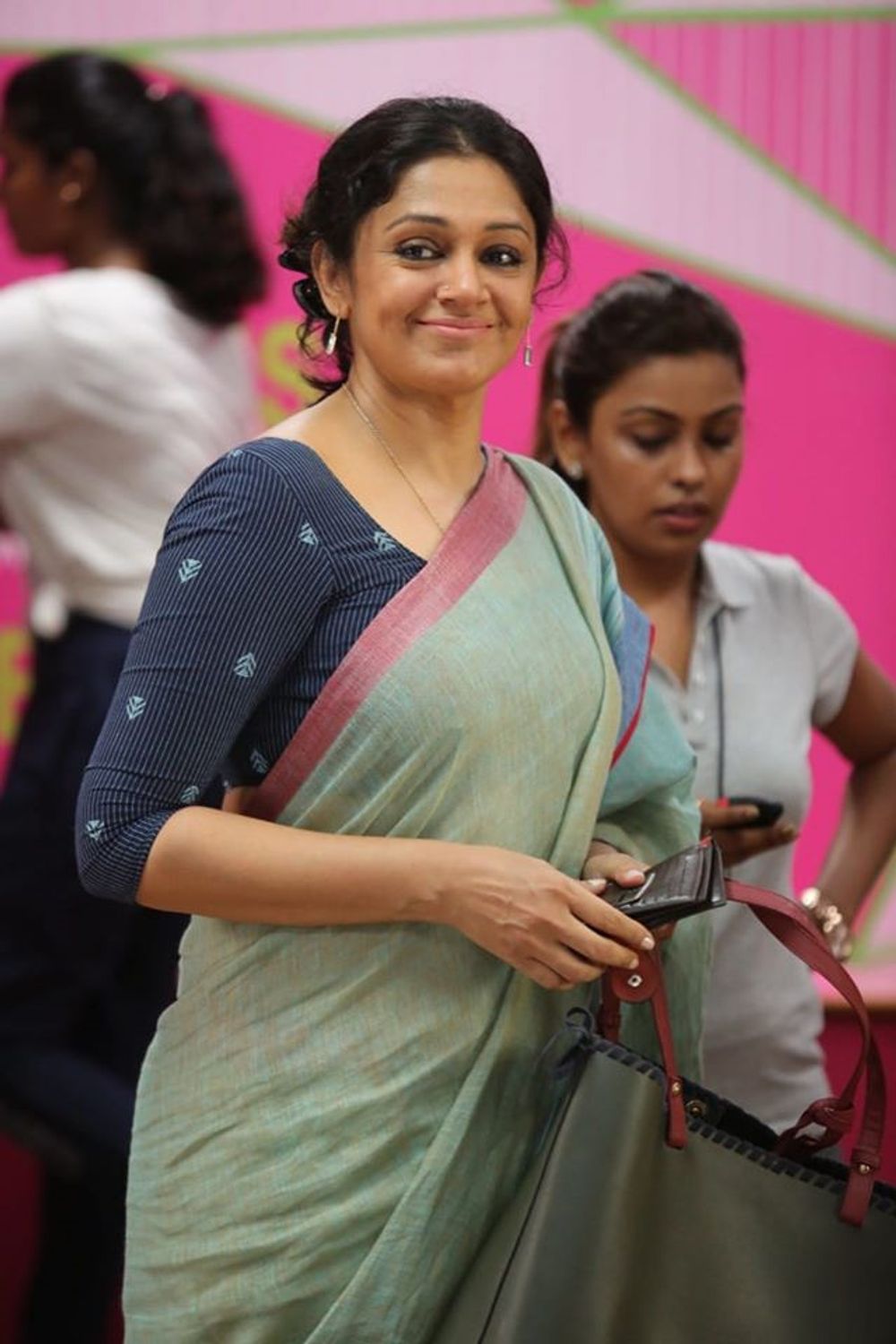What appears to be a simple and pleasant narrative following the lives of a set of characters in an apartment complex, the 2020 Malayalam film Varane Avashyamund unpacks so much more. Presented as a heart-warming story, the film subtly weaves together several instances of rebellion against social conventions.
Bringing back veteran actors Shobhana and Suresh Gopi on silver screen in wonderfully unique roles, the debutant director Anoop Sathyan weaves a family drama that revolves around a middle class residential housing complex in Chennai, in Varane Avashyamund. The mother-daughter duo named Neena and Nikitha (played by Shobhana and Kalyani Priyadarshan respectively) who are already residents of the building are introduced to Major Unnikrishnan ( played by Suresh Gopi), a retired army officer and the family of Bibeesh P. ( played by Dulquer Salman), after they move into the apartment. There onwards, the narrative captures the growing bonds between these characters as they maneuver their relationships and struggle to understand the implications of the same on one another.
The setting of Varane Avashyamund becomes a significant story telling device as it positions the cultural values and prejudices internalised by a typical middle class society. This becomes the backdrop against which the protagonists are shown living life by their own rules and having fun with it. This device of class and its associated values is what makes the actions, dialogues and attitudes of the characters unconventional.

Image Source: Onlookers Media
Re-imagining the concept of arranged marriages
Malayalam cinema is not alien to the age-old perception of how an arranged marriage must play out on screen. It invariably begins with a “pennu kaanal”(the groom officially meeting the bride),where hordes of family members hover around an awkward exchange of tea and bashful glances. While this format has thankfully been discarded in most recent films, the concept of an arranged marriage with the girl being the most active member in getting things done is a concept we never knew we needed until we see Nikitha in Varane Avashyamund .
What further topples the dynamics of a typical Malayali household is how this “efficiency” of being a mother does not stop Neena from realising her private and professional goals as a woman and individual
Traditionally, female leads in movies are either in the process of falling madly in love with the male protagonist or busy being the epitome of filial devotion by consenting to a good match arranged by her parents. But Nikitha is seen to break out of both these moulds as she sets out on a pursuit to arrange herself a good marriage through a matrimonial website, with little to no inclination towards romance.
Her tireless attempts at meeting prospective grooms leads to a fun bond with those working for the matrimonial. This is a breath of fresh air that shakes away any vestiges of the unnecessary shyness that an aspiring bride-to-be is expected to display. Depicted playfully, this element of Nikitha’s character has radically given the woman her agency even within a mode of marriage that is conventionally mediated by older family members.
Blurring the line between Woman and Mother
A pivotal aspect of the premise of Varane Avashyamund is that Neena is a divorced, single mother. With its refreshingly pleasant depiction of single parenthood, the film strays away from any sense of trauma or humiliation at the lack of a father figure as Nikitha repeatedly asserts that her mother’s efficiency which did not necessitate anything more. What further topples the dynamics of a typical Malayali household is how the “efficiency” of being a mother does not stop Neena from realising her private and professional goals as a woman and individual.
Neena perfectly embodies the role of a mother while not compromising her identity as a woman. She takes pleasure in simple compliments on her appearance, remains unabashed in knowing that her daughter sees her as a ‘romantic’ and speaks about her romantic interest towards Major Unnikrishnan with no reservations even in the face of her daughter’s disapproval. From expressing her dislike at finding a partner through online matrimonials, Neena is also shown voicing her concerns about her daughter never experiencing romance. She speaks about how marriage is not the most important step for a woman, though if a woman wants to marry, she must marry someone who accepts her the way she is. Such a reversal of roles and open conversations addressing their issues head on, has its roots in the kind of progressive womanhood and motherhood Neena embraces.

Image Source: Firstpost
Her role addresses the romantic facets of a mother as naturally as it should be in the case of any woman. Her growing relationship with the Major is depicted beautifully as she moves on from an abusive past on her own terms. Her taking initiative to develop the relationship and the unabashed admission of her feelings to those around her is testament to the agency she holds as a woman in control of her life where the society and its prejudices are pushed to the back burner.
Patriarchy is ingrained in the institutions of marriage and family which systematically put women at a disadvantage. This is reflected in most media representations which condition women into following the idealised and outdated patterns of being a wife and a mother. Within this context of internalized patriarchy, women get stripped off all signs of desire and individuality upon entering motherhood.
Also Read: ‘Shakuntala Devi’ And The Patriarchal Trope Of The ‘Good Mother’
Neena’s role goes against this tiring tune of the ever-sacrificing mother and that makes her one of the most striking characters Malayalam cinema has put across in a long time. This is a rarely explored and underrated depiction of motherhood on screen. Throughout Varane Avashyamund, her character reinforces the much needed message that marriage, divorce, motherhood and single parenthood can be embraced by women without giving up on the self.
Unlearning, acceptance and maturity in relationships
Neena’s brother (played by Lalu Alex) is another character who reinforces the progressive moral fabric of the film. A brother would traditionally partake in the moral policing and protection of his sister’s ‘honour’, being the male guardian figure in the family. But Neena’s brother is shown to be light heartedly joking with his niece about his sister’s extensive dating history and her impulsive actions in the pursuit of romance. He is also seen to be supportive of her developing relationship with the Major, thereby offering us a glimpse of the empathy and non-judgmental safe space a family member can provide to a single mother.
The idea of how adulthood should comprehensively be understood is further explored with the character of the retired Major,who seeks professional mental health counsel to navigate his emotional blocks. This is a much needed deviation from the stereotypical alpha male tropes, especially used to depict retired army veterans in Malayalam cinema
Nikitha’s eventual approval of her mother’s relationship becomes a lesson in acceptance and maturity as she unlearns her own regressive notions of motherhood. Looking at parents as individuals with needs and desires beyond the care giving role that they play towards their children, is an important responsibility of both their off springs and the society.
Addressing masculinity, vulnerability and mental health
The idea of how adulthood should comprehensively be understood is further explored with the character of the retired Major,who seeks professional mental health counsel to navigate his emotional blocks. This is a much needed deviation from the stereotypical alpha male tropes, especially used to depict retired army veterans in Malayalam cinema. Here, Major Unnikrishnan embarks on a journey of listening to his weaknesses, building relationships and growing from there with the help of his preppy therapist. Positive representations of seeking mental health care is another aspect of Varane Avashyamund that deserves mention.

Image Source: Moviebuff
By asserting that the man’s ego needed to be brought down, and that his anger issues required professional help, the film goes a long way in deconstructing the glorification of the “angry, macho man” whose ego is only stoked through on screen. Drawing a sharp contrast to the grumpy, retired army man with anger issues as was introduced in the beginning of the film, Major Unnikrishnan grows to awkwardly fall for the charming Neena, who aids him in his journey to open up to emotional intimacy. With a scene that also shows him on the brink of tears after listening to Neena’s past, his character successfully invalidates several cemented tropes of toxic masculinity.
This film appeals to older and younger audiences alike owing to the honest depictions of characters and their struggles with adulting and parenting. This is coupled with the romantic and not-so-romantic pursuits of love by both young and old characters alike. The characters feel familiar, like ‘people-next-door’, who do their bit in mindfully unlearning dated social conventions, patriarchy and toxic masculinity.
Also Read: 3 South Indian Films That Pass The Bechdel Test
Along with the message that growing and learning to love take effort and an open mind, the audience is left with a lingering feeling of camaraderie with the characters.
Varane Avashyamund is a warm story that easily finds a place in your heart with its fun, frolic and necessary social critique long after the credits roll.
Featured Image Source: Manorama
About the author(s)
Akhila is a first year MA student pursuing English and Communication Studies at Christ University. She is hopeful about creating change through writing and academic praxis, and when that gets a little tiring, escapes into books and TV shows.




